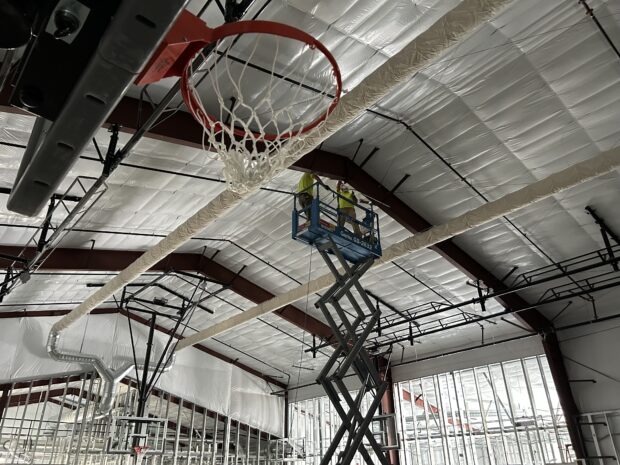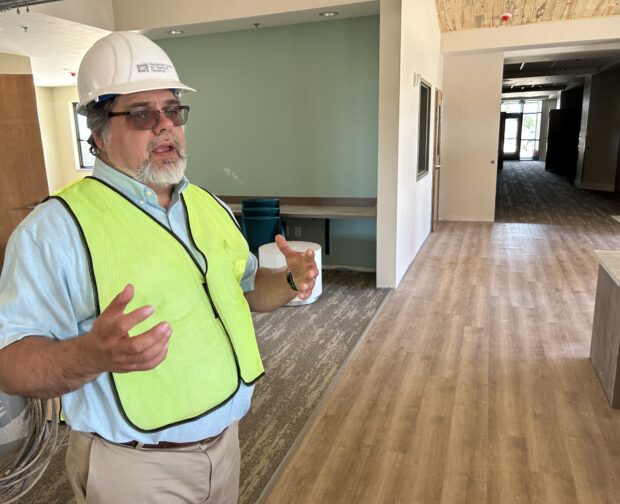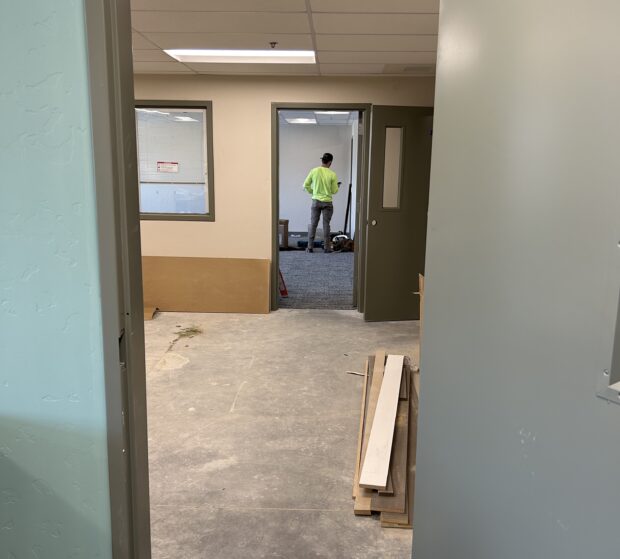
Longtime Payette educator and administrator Rick Hale has been a principal without students — or a school — for the past year.
That’s all changed.
Through the fall and into spring, Hale watched concrete walkways between buildings poured; dormitories and a gymnasium built; carpets, flooring and sinks installed; a non-scalable security fence erected around the campus perimeter.
And on a recent hot, dusty afternoon, Hale smiled and announced that his classroom whiteboards were going in today.
Hale was hired last summer as education director for a new charter school in Middleton that offers a unique public education model for kids who’ve experienced severe trauma.
“They were looking for someone to build it and lead it,” he said. “It was like it spoke to me.”
The 64-student Promise Academy school will be located on the campus of the Idaho Youth Ranch’s (IYR) new Residential Center for Healing and Resilience, a residential treatment facility — which means 24-hour care — for ages 11-17 experiencing severe mental health and behavioral issues.
The charter school provides intensive treatment while they attend school, all on the same campus. It will serve grades 6-12 and is set to open in the fall with eight students. It is estimated that students will spend six to nine months in the program.

“In my 25 years in education, this was the first year in all that time that I haven’t had kids, teachers or classes to be in. So I’m really looking forward to having school again,” Hale said.
In order to heal these young people, the program needs to provide a very stable environment for a number of months, said Scott Curtis, CEO of Idaho Youth Ranch.
That means highly trained staff to meet their emotional needs and engaging them in academics immediately, Curtis said.
Often mental illness has caused them to be removed from public schools: a detention, suspension or expulsion, Hale said. They may suffer from disorders like depression, bipolar, oppositional defiance, post traumatic stress or suicidal feelings.
“We really have to get the resources and personnel to focus on them,” Hale said.
Educators and care staff will be part of one team, speaking the same language with the youth. Teachers and support staff will train in de-escalation techniques and incident management, just as the care team will train in areas of curriculum, assessment, instruction, and classroom management, explained Susan Visser, director of IYR’s Hands of Promise Campus.
“We did a lot of in-depth work around both the residential program itself and also the school to come to the place where we are now,” she said
The charter school’s authorizer is Middleton School District. Because it is a public school, the education is free but the treatment portion will be covered by Medicaid, private insurance or scholarships.
“There’s such a need and there just are not enough places that can offer that kind of service. Being able to support something that provides that service for kids was tremendously important to us,” said Middleton Superintendent Marc Gee.

Because students come and go at all times of the year, the school must provide highly individualized instruction, assessing them when they arrive and providing them with their individualized education plan requirements and grade-level instruction.
For those who have fallen behind in their studies, “we’ll also have significant intervention resources available,” Hale said.
With over 250 acres surrounding the campus, the education experience will be hands-on. “This is not sitting in front of a computer. We’re going to be very involved with doing things, being outside, really finding out what the kids are interested in,” Hale said, like cooking, gardening, outdoor activities and working with animals.
Promise Academy will work closely with parents and guardians. The plan is to have family housing on-site, because families are part of the therapy and healing, he said.
“We’re all here for them. And whether they believe it or not, on day one we want to see them do great things,” Hale said.
The youth ranch’s history dates back 70 years
The Idaho Youth Ranch was founded in 1952 by Reverend James Crowe and Ruby Carey Crowe. President Harry Truman and Congress granted the Crowes the right to buy 2,560 acres in Rupert for $1 per acre per year for 25 years, with no interest. Eventually, the campus grew to include five large residential lodges, a full-size gymnasium, dining hall, education building, and riding arena.
In 2015, IYR decided to relocate the ranch facility from Rupert to a location closer to the state’s population center in the Treasure Valley. The same year, a 258-acre piece of property was purchased in Middleton to serve as the new ranch.
Education nonprofits and local foundations play key role
Bluum has played an “instrumental role in the school’s development, from assisting with formation of the charter school to assistance and guidance as we prepared to hire our school leader,” said Jeff Myers, IYR vice-president for marketing and communications. “Bluum has brought invaluable expertise and support.”
Promise Academy also secured a competitive federal Charter School Program grant through Bluum.
Foundations like the J.A. and Kathryn Albertson Family Foundation, as well as more than 500 generous individuals, helped cover the cost of construction, program design, and early staffing. The facility will open debt-free, Myers said.
Disclosure: Idaho Education News and Bluum are funded by grants from the J.A. and Kathryn Albertson Family Foundation.

